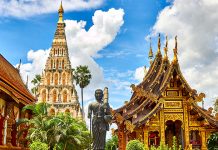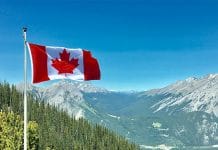Welcome Olga and Nikolai!
Where are you from?
Olga: Poland
Nikolai: Germany
Where do you currently live and what countries have you lived in together?
Olga + Nikolai: Winnipeg, Canada (August 2006-December 2006), Hamburg, Germany (September 2007-October 2008), Delft and Rijswijk, The Netherlands (September 2009 until now).
How did you meet?
Olga: In 2004, I took part in the Socrates Erasmus student exchange program in Hamburg. We were staying in the same student residence. I had a Spanish flatmate who was best friends with Nikolai’s Spanish flatmate (we lived in apartments with 4-5 other people from different countries), so we got to do a lot of things together: parties, pub outings, sightseeing etc. Another person who was crucial to our meeting and hanging out together was Nikolai’s German friend and flatmate. I mention him here, because he attended our wedding where he met a Latvian friend of mine–they got married this past year in May.
Everybody seemed to suspect that we were going to be a couple, except for myself. But soon I found that Nikolai was an honest, intelligent, funny man, whom I could always trust. Initially, I planned to stay for one semester, but then decided to stay for another six months–he was the main reason I stayed. I knew what I getting myself into: a long-distance relationship without any guarantee of things working out. But I still went for it. After that year, I went back to Poland, but Nikolai was awarded a scholarship by the DAAD (German Academic Exchange Service) and he went to Canada where he stayed for one year. I joined him for four months, and then came back to Poland to graduate.
After that, I started a Master’s degree in Media Culture at the University of Bremen. This is when we moved in together for good. We lived in Hamburg, Germany, and I took the train to Bremen whenever I had classes. Nikolai then got his PhD in Physics and found a job in the Netherlands, while I stayed in Germany. In the meantime, I became pregnant. I moved to the Netherlands when Klara was 6 weeks old.
How old are your children and where were they born?
Olga + Nikolai: We have two girls. They are three years old (born in 2009) and one year old (born in 2011). Klara, the eldest, was born in Germany, while Julia was born in the Netherlands.
What passports do you and the kids hold?
Olga: I have a Polish passport. I wanted the girls to have a both Polish and German passport, but since Polish passports for children are only valid for one year, the children only have German passports.
Nikolai: I have a German passport, and so do the children.
What languages do you each speak and what language do you speak together?
Olga: I speak Polish, German, English, some Dutch and some French.
Nikolai: I speak German, English, French and some Dutch. We speak German together.
In what languages do you speak to the kids?
Olga + Nikolai: Olga speaks Polish with the children, and Nikolai speaks German.
What languages do the kids speak?
Olga + Nikolai: Our younger one doesn’t really speak yet (she says “mama,” but that’s the same in all the languages we use). The older one speaks all three languages, and she is just learning to differentiate between Polish, German and Dutch. She therefore uses more Polish with Olga, more German with Nikolai, and she understands a lot of Dutch since they both attend a Dutch daycare.
How do you reinforce the languages beyond just the parents speaking it?
Olga + Nikolai: We visit both of our families regularly. Also, we plan to send the children to the European School in The Hague. While the classes there are in Dutch (or English or Italian, depending on what the parents speak), they also offer support in mother tongues for some languages, including German. As for Polish, we are planning to send them to a Polish Sunday school in the Netherlands.
What does raising a little global citizen mean to you?
Olga + Nikolai: It’s about tolerance and being open. It is important to us that our children are exposed to a multitude of cultures and languages and we are very happy to be able to provide this. In the Netherlands, cultures exist parallel to each other, but they also influence each other. A nanny working at our children’s daycare is Muslim, and she wears a headscarf. On the streets, there are black people, Asian-looking people, people of all colors and religions.
Do you have any advice for parents raising multilingual kids on what works and what doesn’t?
Olga + Nikolai: Being consistent works, but other than that each family is unique and what could work for one family, may not work for another. Also, learning the theory behind multilingualism is important, and so is patience, patience, and some more patience.
What religion are you both? And how are you raising the kids?
Olga: My parents are Catholics, although not very religious ones. I was raised to be Catholic as well. I was baptized, had the Holy Communion and Confirmation. I got married in a Catholic church. For this wedding, we needed a special permission from the bishop because my husband-to-be was of a different faith (i.e., no faith). However, I haven’t been to church for a long time, and I’m not very religious. Our elder daughter was baptized in Poland, but I saw it as a part of my cultural heritage rather than belonging to a particular faith.
Nikolai: I am an Atheist and not really interested in religion. Religion is not a very important topic in our home, but we do talk about it, especially about the differences in the way our countries deal with this topic. We’re not really involved with any religious activities.
What are some of your biggest cultural differences?
Olga + Nikolai: We are no different than other, monocultural couples. When we argue, it’s more because we have different ideas on how to raise children. And while we’re shaped by our cultures, maybe in multicultural families, the impact of cultures is overrated. Because aspects like our social environment, interests and our families play a role as well. So, we don’t really feel like an intercultural family. We feel like a family that just happens to speak different languages.
What have been your greatest challenges as an intercultural family?
Olga + Nikolai: Raising multilingual children, while beneficial and exciting, is a real challenge. We have to know the theory behind it, find schools and caregivers that are supportive of it, and always explain why we’re doing what we’re doing. Another thing are family reunions. Many families can celebrate Christmas together without having to travel anywhere. Us? Let me give you an example of last year’s Christmas.
From Amsterdam, we flew to Warsaw, Poland to celebrate Christmas. Since Nikolai has family in Osnabrück, we flew there shortly after Christmas. From there, we went to Kiel, where Nikolai’s parents live. And we also passed via Hamburg to meet friends. In the end, we flew back to Amsterdam, and took the train back home. Family reunions are nice, but also exhausting. Plus we don’t really count this as a holiday.
What have been your greatest joys as an intercultural family?
Olga + Nikolai: Seeing our children grow and pick up new languages. Making new friends, learning a new culture and a new language. We also experience the same joys that monocultural families experience: seeing our children grow up and learn new skills. The fact that we are an intercultural family doesn’t really define our lives, it’s just one aspect.
Thank you Olga and Nikolai!




































[…] Real Intercultural Family: Olga and Nikolai […]
[…] nomination and the honorary prize for the Expats Blog Award, the interviews (see here, here, and here) and guest posts I was asked to do (see for example here)and the jump in traffic. I want […]